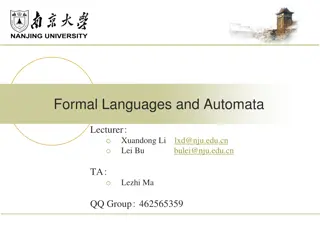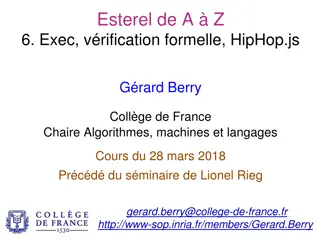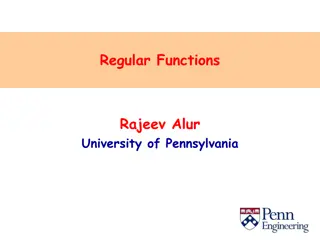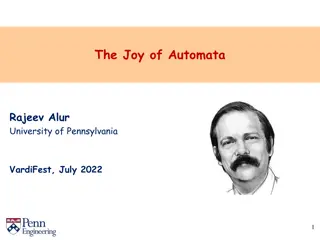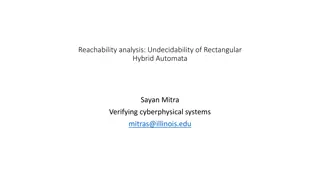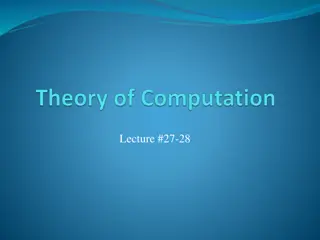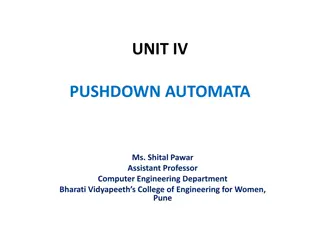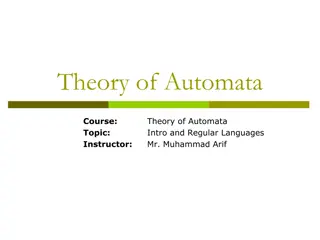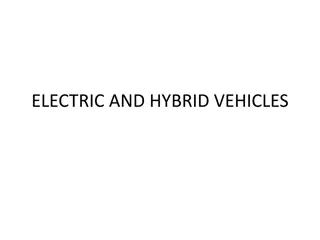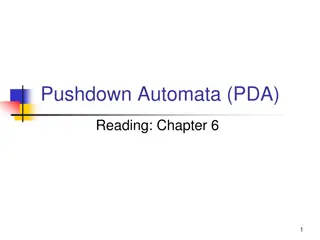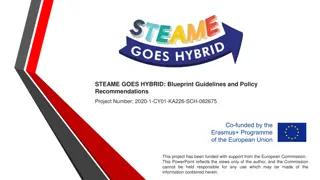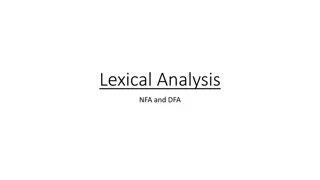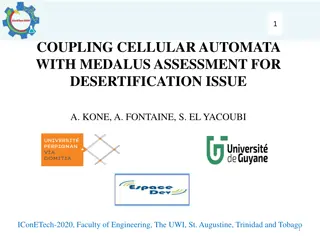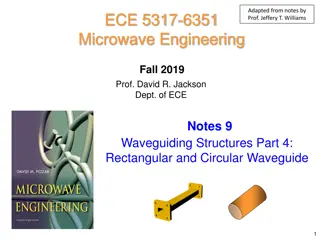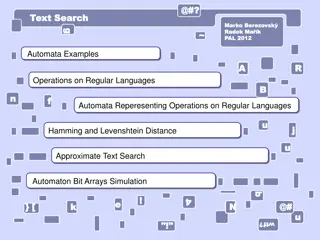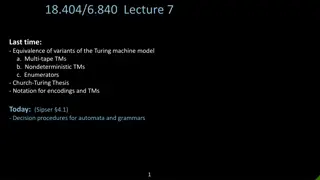Formal Languages and Automata Theory
This course delves into abstract models of computers and computation, offering essential concepts and principles for understanding the fundamental nature of the computer field. Exploring topics such as regular expressions, context-free grammars, and automata theory, students gain insights into the p
6 views • 11 slides
Advantages and Applications of Rectangular Tubing
\nRectangular tubing stands as a versatile structural element, boasting a myriad of advantages and applications across various industries. From its inherent strength and stability to its adaptability in design, understanding the multitude of benefits and practical uses of rectangular tubing is cruci
8 views • 5 slides
Formal Verification and Automata Abstraction in Esterel
This content delves into the applications of formal verification and automata abstraction in Esterel, focusing on techniques such as verification by abstraction of automata, boolean verification using BDDs, bounded model checking in SAT/SMT, and more. The work of Gérard Berry at the Collège de Fra
0 views • 38 slides
Abstract Domains for Lists and Heap Structures: A Comprehensive Overview
Explore the concepts of quantified data automata on skinny trees, automatic shapes in static analysis, universally quantified properties on lists, heap configurations with skinny trees, and the extension of quantified data automata over lists. Dive into the abstract domain of automata to capture inf
1 views • 20 slides
Finite Automata and Regular Functions in Computer Science
Exploring the concepts of regular functions, languages vs functions, finite-state computation, finite automata with cost labels, finite automata with cost registers, and examples of Cost Register Automata. These topics delve into the theoretical and practical aspects of defining functions and comput
4 views • 46 slides
The Legacy of Automata: Insights from Rajeev Alur at VardiFest 2022
Delve into the fascinating journey of Rajeev Alur's contributions to automata theory, from his early mentorship under Moshe Vardi to groundbreaking collaborations and key insights on automata over infinite words. Discover the essence of automata, its significance in decision problems, and the techni
3 views • 32 slides
Automata Theory and Theory of Computation Overview
This course overview covers concepts in automata theory and theory of computation, including formal language classes, grammars, recognizers, theorems in automata theory, decidability, and intractability of computational problems. The Chomsky hierarchy, interplay between computing components, modern-
15 views • 42 slides
Undecidability in Rectangular Hybrid Automata Analysis
The undecidability of the reachability analysis in rectangular hybrid automata (RHA) poses challenges for verifying cyber-physical systems. This complexity was demonstrated through a reduction from the Halting problem of two counter machines by Henzinger et al. Additionally, the review of computabil
2 views • 15 slides
Pushdown Automata (PDA) in Computer Science
Pushdown Automata (PDA) are essential in theoretical computer science, serving as an extension of non-deterministic finite automata (NFA). PDAs incorporate a stack, enabling them to recognize non-regular languages. They are described by transitions involving input symbols, state changes, and stack m
4 views • 46 slides
Pushdown Automata (PDA) in Computer Engineering
Pushdown Automata (PDA) is a powerful computational model that extends the capabilities of Finite Automata (FA) by incorporating a stack memory. PDAs can accept languages that FA cannot, making them essential in theoretical computer science. They consist of components like input tape, finite control
0 views • 59 slides
Theory of Automata: Introduction and Regular Languages Overview
This course delves into the fundamentals of Theory of Automata, exploring topics such as regular languages, finite state models, grammars, Turing machines, and more. Instructor Mr. Muhammad Arif guides students through essential concepts like finite automata, pumping lemma, decidability, and Chomsky
2 views • 95 slides
Electric and Hybrid Vehicles: Hybridization and Interdisciplinary Aspects
Electric and hybrid vehicles (HEVs) feature different hybridization ratios based on the power rating of their electric motors. Concepts like full hybrid, mild hybrid, and micro hybrid define the extent of electric motor usage for driving. HEVs involve a mix of electric machines, power electronics, b
15 views • 50 slides
Pushdown Automata (PDA) for Context-Free Languages
Pushdown Automata (PDA) is a crucial concept in the theory of computation, specifically for the recognition of context-free languages. PDAs are an extension of nondeterministic finite automata (NFA) with an added stack memory. This summary provides insights into the definition, transition functions,
0 views • 34 slides
STEAME Goes Hybrid: Blueprint Guidelines and Policy Recommendations Project
The project funded by the European Commission aims to introduce STEAME hybrid learning environments through blueprint guidelines and creativity plans. Teachers will be trained in recording and implementing hybrid learning ideas using Learning and Creativity (L&C) Plan templates, enhancing their abil
4 views • 29 slides
Lexical Analysis
Regular Expressions (REs) play a crucial role in describing regular languages, with the ability to convert any RE into a Deterministic Finite Automaton (DFA). This conversion enables the automation of lexical analysis, a fundamental aspect of language processing. Explore the implementation of REs th
0 views • 34 slides
Theory of Computation: CFG, CFLs, and Pushdown Automata
Dive into the world of Context-Free Grammars (CFGs), Context-Free Languages (CFLs), and Pushdown Automata in the realm of theoretical computer science. Explore ambiguity in grammars, learn how to define pushdown automata, compare regular languages with CFLs, and understand the intricacies of languag
2 views • 25 slides
Nondeterministic Finite Automata
Here is a DFA for recognizing binary strings that either start with a 1 or end with a 1. Dive into the concept of Nondeterministic Finite Automata in the context of formal language theory. Explore the theoretical foundations and practical application of DFAs in processing binary strings. Learn how t
3 views • 39 slides
Teaching Finite Automata with AutomataTutor
Explore the key concepts of finite automata with insights from leading experts in the field. Understand the importance of automata in computer science education, common challenges faced by students, and practical examples on drawing DFAs for specific languages. Discover different types of mistakes e
2 views • 38 slides
Theoretical Computer Science: Deterministic Finite Automata
In the beginning of the course, we delve into computational models starting with deterministic finite automata (DFA). Explore the history of automata theory and the significance of DFAs in computing. Witness the foundation of automata theory laid by pioneers such as Kleene, McCulloch, and Pitts.
2 views • 15 slides
Introduction to Finite Automata and Recognizers
Finite Automata (FA) are graphical models used to compile regular expressions into recognizers capable of determining if a given string is part of a specific language. Non-deterministic Finite Automata (NFA) allow for multiple transitions from a state on the same input symbol, while Deterministic Fi
3 views • 8 slides
Coupling Cellular Automata with MEDALUS Assessment for Desertification Issue
This study explores the connection between cellular automata and MEDALUS assessment in addressing desertification issues. Desertification, a severe form of land degradation affecting arid and semi-arid regions, poses significant challenges to the environment and human well-being. By examining factor
2 views • 17 slides
Rectangular Waveguide: Structure, Modes, and Wave Propagation Analysis
Explore the principles of rectangular waveguides, from their structure as an electromagnetic pipe with a rectangular cross-section to analyzing TEz modes for wave propagation. Learn about boundary conditions, separation of variables, eigenvalue problems, and solving for cutoff wavenumbers in this de
4 views • 61 slides
Recognizability in Automata Theory
Explore the world of automata theory, from deterministic Turing machines to probabilistic models, and their capabilities in recognizing languages. Learn about the nuances of language recognition, error bounds, and the unique properties of different automata classes.
3 views • 28 slides
Finite Automata: Types, Definitions, and Examples
Learn about Deterministic Finite Automata (DFA) and Nondeterministic Finite Automata (NFA), their definitions, differences, and examples. Understand the key concepts of finite automata, including states, input symbols, initial state, final states, and transition functions.
24 views • 59 slides
Hybrid Automata Systems in Formal Systems
Learn about hybrid automata systems in the context of formal systems, including components, transitions, activities, and invariants, as well as how hybrid systems can change through discrete transitions and time delays.
1 views • 37 slides
Automata Minimization Techniques and Applications
Explore the concept of automata minimization, which involves finding and collapsing equivalent states to optimize symbolic automata. Discover its applications, such as generating random passwords and handling symbolic finite automata efficiently.
2 views • 44 slides
DFAs, GNFA, and Regular Expressions in Automata Theory
Explore the concepts of Deterministic Finite Automata (DFA), Generalized Nondeterministic Finite Automata (GNFA), and Regular Expressions in the context of proving language regularity. Learn how to convert between these automata and expressions to demonstrate equivalence.
3 views • 13 slides
Unifying Approach for Multistack Pushdown Automata
Explore the unifying approach for multistack pushdown automata, discussing aspects like finite control, stack operations, and concurrency modeling. Discover how restrictions enhance decidability and intersection closure, offering insights into language classes and automata theory applications.
0 views • 20 slides
Introduction to Finite State Automata: Language and Theory
Explore the world of finite state automata, capturing dynamic behaviors of systems through logical properties. Learn about languages, regular expressions, and how they represent events in systems. Dive into the definitions and examples of regular languages and expressions, unraveling the fundamental
3 views • 18 slides
Language Operations Revisited: Automata and Regular Languages
Explore the operations on regular languages, including union, intersection, and concatenation, along with examples of finite automata construction. Learn about Kleene closure and the relationship between regular languages and automata. Discover how automata support operations on languages.
4 views • 25 slides
Text Search with Automata: NFA, DFA, and Indeterminism Overview
Dive into the world of text search algorithms using Nondeterministic Finite Automata (NFA), Deterministic Finite Automata (DFA), and explore the basics of indeterminism in automata theory. Learn about transitions, states, and processing words with NFA at work.
7 views • 44 slides
Decidability Theorems and Proof Techniques in Automata Theory
Explore the concept of decidability in automata theory with a focus on acceptance, emptiness, and equivalence problems for deterministic and nondeterministic finite automata. Learn about the theorems and proof methods involved in demonstrating the decidability of these key problems.
5 views • 12 slides
Equivalence of Extended Symbolic Finite Transducers
Explore the equivalence of extended symbolic finite transducers in automata theory, including symbolic automata, extended symbolic automata, closure properties, and decidability results. Learn about their applications in various fields like natural language processing, XML, and program analysis.
1 views • 37 slides
Bchi Automata in Formal Systems - CS60030 Lecture Overview
Explore Bchi Automata in the context of formal systems, focusing on concepts such as Peterson's Algorithm, regular languages, and Nondeterministic Bchi Automata. Dive into topics like verifying regular safety properties and analyzing Peterson's banking system for liveness. Discover the implications
1 views • 33 slides
Formal Languages and Automata Theory
Explore the concept of formal languages and automata theory, including language concatenation, recognizing languages with machines, and finite automata. Learn about simple automata examples and deterministic finite automata (DFA) definitions in this insightful overview.
1 views • 14 slides
Automata and State Transitions in MATLAB TCT
Explore the functionality of automata and state transitions using MATLAB TCT. Learn how different states and events impact the behavior of systems, such as cars, in a visual and interactive manner. Dive into the world of automata theory and state transition functions with these informative illustrat
6 views • 27 slides
Timed Automata Course at IIT Kharagpur: Formal Systems Overview
Explore the Timed Automata Course at IIT Kharagpur, covering topics like Simple Light Control, Mouse Clicks, Model Checking, Systems and Automata, Examples of Models, and Timed Automata informally. Learn about formal systems, state machines, real-valued clocks, and transition systems represented as
0 views • 40 slides
Autonomous Learning - Automata Theory and Formal Languages Course Overview
Explore concepts in automata theory, formal languages, and computational theory in this comprehensive course led by Instructor Ananth Kalyanaraman. Delve into regular languages, context-free languages, Turing machines, and more. Discover the intricacies of grammars, recognizers, and theorems in auto
3 views • 16 slides
Theory of Computation: NFA, DFA, Regular Expressions, Automata
Explore the concepts of Nondeterministic Finite Automata (NFA), Deterministic Finite Automata (DFA), regular expressions, and automata in the Theory of Computation course. Learn about converting NFAs to DFAs, designing regular expressions, acceptance in an NFA, simulating NFAs with DFAs, and more.
0 views • 25 slides
Understanding Pushdown Automata in Theoretical Computer Science
Dive into the world of pushdown automata, a formalism that extends the capabilities of regular languages using a stack. Learn how pushdown automata work, their transition functions, and their power in recognizing context-free languages.
0 views • 29 slides
